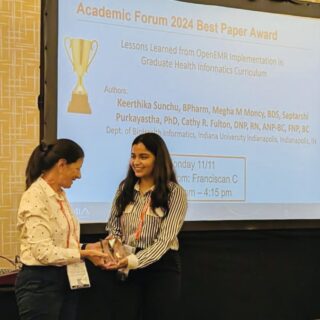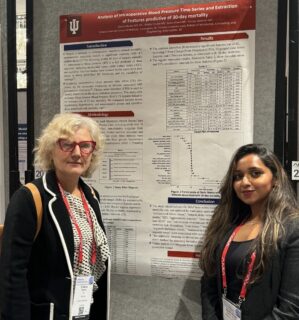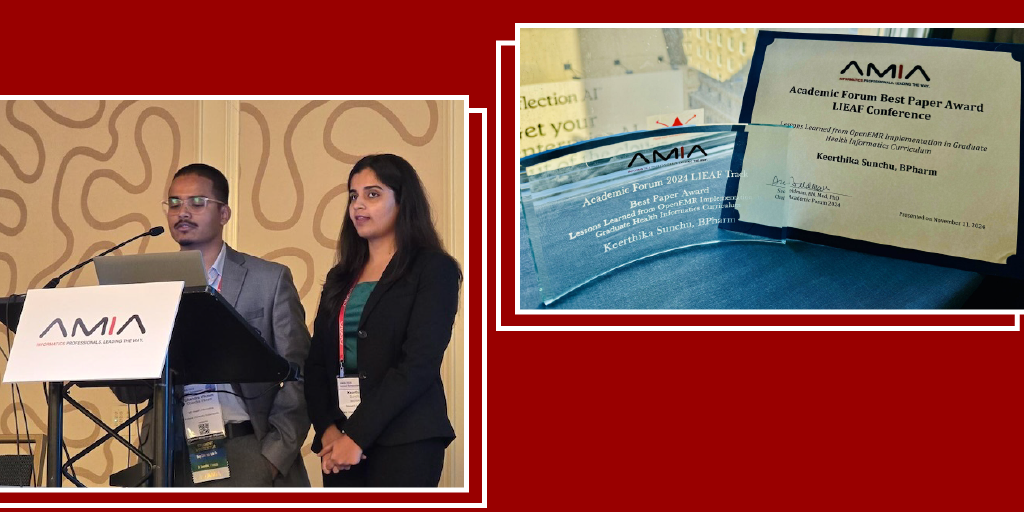The AMIA (American Medical Information Association) Annual Symposium is renowned for its comprehensive program, featuring workshops, scientific sessions, and keynote presentations that cover a wide array of topics in biomedical and health informatics. This year three Luddy Indianapolis graduate students studying Health Informatics—Chandra Vikram, Keerthika Sunchu (both pictured in above photo, l-r), and Sadia Afreen—attended the Symposium and presented their papers; Sunchu was recognized with the Best Paper Award.

Keerthika Sunchu receiving Best Paper Award
Sunchu’s presentation “Lessons Learned from OpenEMR Implementation in Graduate Health Informatics Curriculum,” focused on integrating OpenEMR into health informatics courses. The inspiration came from addressing the gap between theoretical knowledge and hands-on EHR skills. This research is critical to advancing the field as it emphasizes practical EHR training, user-centered design, and global collaboration, ultimately preparing students to navigate real-world healthcare IT challenges effectively.
“Attending the AMIA Conference was a transformative experience. It provided me with the opportunity to engage with leading experts in the field, attend insightful sessions, and gain exposure to the latest advancements in health informatics. Winning the Best Paper Award was a significant honor, validating the hard work and dedication invested in my research. The recognition has opened doors for future collaborations and has been instrumental in shaping my professional trajectory,” Sunchu said.
Vikram, along with Sunchu, presented Carepal for SMARTLiver: A Comprehensive Cirrhosis Care Solution. This project was inspired by the need to provide cirrhosis patients with a centralized and user-friendly platform to manage their health while equipping clinicians with tools to enhance patient care. “A highlight of the event was having my application, Carepal for SMART Liver: A Comprehensive Cirrhosis Care Solution, selected as a finalist for the HL7 FHIR App Competition. This recognition underscored the real-world relevance of my work and provided an incredible platform to connect with leading experts, exchange ideas, and explore future opportunities for innovation in health IT,” Vikram said.
The app features two interconnected sides: patient-facing and clinical-facing. This dual approach bridges the gap between patients and providers, fostering better communication, engagement, and outcomes in cirrhosis management.
Afreen’s presentation “Analysis of interoperative blood pressure time series and extraction of features predictive of 30-day mortality,” involved systematic evaluation of features associated with perioperative morbidity; features, often overlooked in traditional methodologies. She said she has always been fascinated by statistical approaches and analysis that can be taken to improve surgical enhancement in real-world scenario. “The project involved real-time patient data which gave me an opportunity to dive into this prospect of post-operative improvements. I believe that advancements in this field to bring about state of the art methodologies to improve early onset of mortalities in patients. Leveraging data science and statistical approaches as these could overcome the limitations faced by current methods to understand the post-operative mortality.”
Sunchu and Vikram are scheduled to graduate in early 2025, Afreen completed her master’s degree in December 2024.
Advancing global impact
All three have been heavily involved outside the classroom at IU Indianapolis. Sunchu works as a Research Assistant at the Purkayastha Lab for Health Innovation, contributing to projects involving EHR integration, OCR-based neonatal monitoring, and global health initiatives. She is also a Teaching Assistant, mentoring students in data analysis, machine learning, and SQL.
Vikram serves as an Analytics Project Assistant for International Relations at the Office of International Affairs at Indiana University. His role focuses on analyzing and interpreting data to derive actionable insights that support the team in monitoring and strengthening relationships related to scholarships, academic collaborations, research initiatives, and the university’s progress toward United Nations Sustainable Development Goals (SDGs). Through data-driven strategies, he contributes to fostering meaningful international partnerships and advancing the university’s global impact. He is also a Teaching Assistant, mentoring students in data analysis, Healthcare systems, ELT (Extract Load Transform) pipelines in healthcare, and Electronic Health Records.
Afreen also served as Research Assistant under Purkayastha, Health Informatics Program Director in the Department of Biomedical Engineering and Health Informatics, and as his Program Assistant. Through these roles, she contributed to several cutting edge projects in collaboration with MIT and Emory University leading to several publications and career advancements. She also worked as a Data Scientist at Indiana University Health in Department of Anesthesiology. Besides academia, Afreen actively contributed towards campus community, leading three clubs as President, E&T Ambassador, and PR Head, while also serving as a global ambassador for the OIA.
Addressing critical challenges
Sunchu said she chose Health Informatics because it bridges healthcare and technology, allowing her to address critical challenges in patient care through innovative IT solutions. Luddy Indianapolis stood out because of its interdisciplinary curriculum, cutting-edge research opportunities, and strong focus on real-world applications in health IT. She aims to become an EHR Analyst, contributing to optimizing electronic health record systems to improve clinical workflows, data interoperability, and patient care outcomes.
Vikram chose Health Informatics because it seamlessly integrates my background in pharmacy with my passion for technology, enabling me to tackle critical challenges in patient care through innovative IT solutions. “My undergraduate studies in pharmacy fueled my curiosity about the intersection of healthcare and technology, inspiring me to explore how data and IT can improve patient outcomes. Luddy Indianapolis stood out to me for its interdisciplinary curriculum, cutting-edge research opportunities, and strong emphasis on real-world applications in health IT, making it the ideal place to pursue my aspirations,” he said.
After graduating, Vikram aspires to pursue a career as a data analyst/data scientist, with a particular focus on leveraging data to drive impactful decision-making in healthcare. “My goal is to work in roles that allow me to analyze complex datasets, develop predictive models, and uncover actionable insights that improve patient outcomes and operational efficiency. I am particularly passionate about working on projects that intersect with health informatics, such as optimizing healthcare delivery, enhancing patient engagement, and advancing research through data-driven solutions.”

Sadia Afreen with poster presentation
Afreen said “Ever since my undergraduate years, I was passionate about bringing change in healthcare and medicine. I realized that my passion for healthcare and my skillset in data science could both be combined to bring about the impact that I strived towards. Studying Health Informatics helped me grow towards this dream of mine.” She chose Luddy for the data science focus that it provides and because it allowed her to chose from vide variety of courses to streamline her niche in health informatics, which led her to become a data scientist specifically in Radiology AI. Luddy also makes it compulsory to complete a capstone or thesis, which built a pathway towards her goal to pursue a PhD further on.
Afreen recently started a new full-time position at Penn Medicine, University of Pennsylvania, under Department of Radiology as a Data Scientist and will be working in image computing and analysis of MRIs, with the intention to expand her career with a possibility of a PhD in the same field, i.e Radiology Imaging and AI.
Invest in yourself and stay curious
Sunchu advises others to embrace opportunities like AMIA to network, present their research, and learn from diverse perspectives. She recommends to always focus on developing practical skills alongside theoretical knowledge, as hands-on experience in EHRs and data analytics is crucial. And to stay curious, adaptable, and proactive in addressing challenges in health IT.
Vikram said attending the AMIA Annual Symposium was a pivotal experience that deepened his understanding of the latest advancements in health informatics. The symposium’s comprehensive program, featuring workshops, scientific sessions, and keynote presentations, offered invaluable insights into a wide range of topics in biomedical and health informatics.
“My advice to other Health Informatics students is to actively participate in conferences like AMIA. These events offer unparalleled opportunities for both professional and personal development. Professionally, you gain exposure to cutting-edge research, innovative tools, and trends shaping the future of health IT. Networking with experts, peers, and industry leaders can open doors to collaborations, mentorship, and career opportunities.”
“Personally, attending such conferences broadens your perspective, boosts your confidence, and sharpens your communication skills, especially when presenting your work to a diverse audience,” Vikram said.
Afreen has been attending AMIA since 2023, as volunteer, moderator and presenter. This year AMIA provided her with a platform to present her research work done at IU Health amongst esteemed researchers. Besides presentation, she also had the opportunity to attend various generative AI and medical imaging sessions, which helped her in her career growth, as these niche areas are her focused disciplines moving forward in her career. “I realized that there was a lot to learn from these sessions as the researchers presented their work, and limitation, which could be applied to my current thesis work to further enhance it. AMIA had different sessions such as a career booth where we had the opportunity to go and talk to different company representatives, moreover, it also had certain exhibits and competitions which were very interesting.
“I would say that, please go out of your comfort zone every chance you get. Be it attending such conferences, even if you aren’t presenting, or perhaps applying to a job you feel underqualified for; push yourself to your best and highest limits. Additionally, while being a student, investing in yourself, your skills, learning and development is the biggest asset that you can build,” she said.
Media Contact
Joanne Lovrinic
jebehele@iu.edu
317-278-9208


